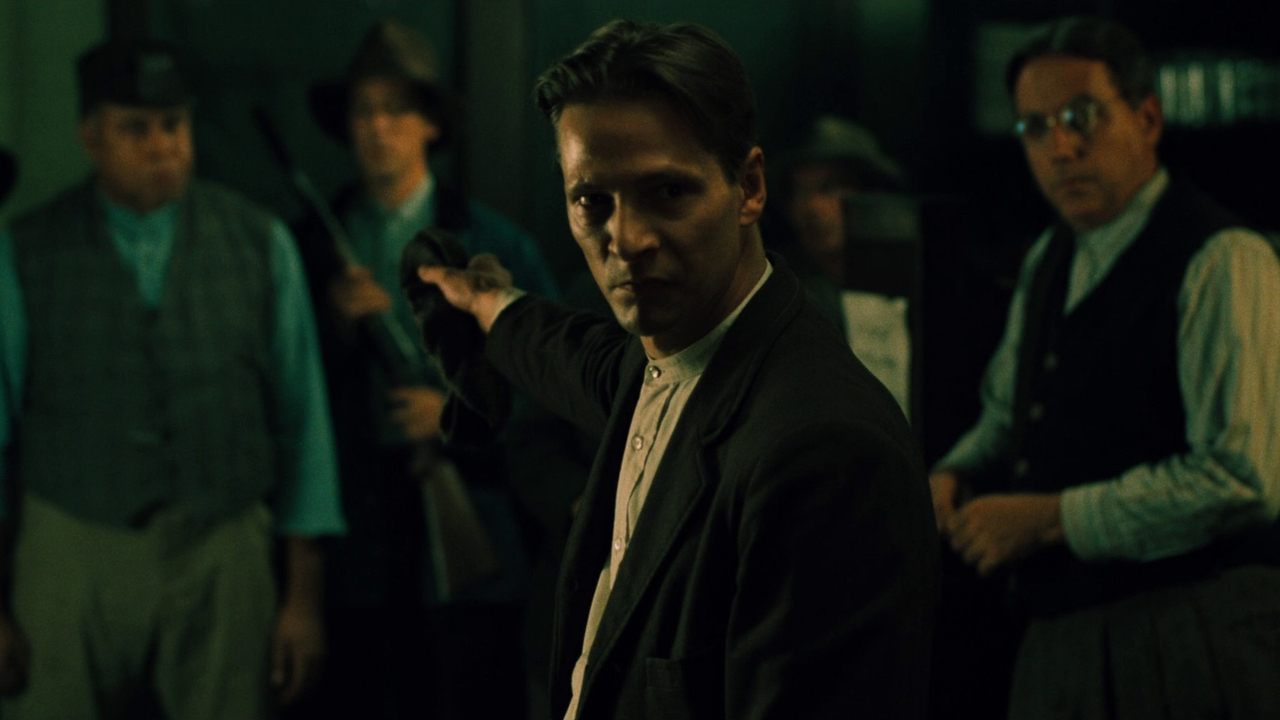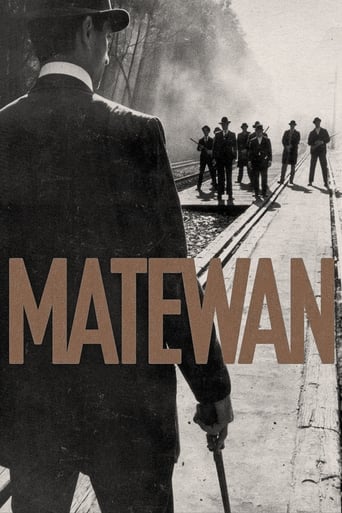

Blending excellent reporting and strong storytelling, this is a disturbing film truly stranger than fiction
... View MoreIt's an amazing and heartbreaking story.
... View MoreA terrific literary drama and character piece that shows how the process of creating art can be seen differently by those doing it and those looking at it from the outside.
... View MoreThe storyline feels a little thin and moth-eaten in parts but this sequel is plenty of fun.
... View MoreBeing a European I had some difficulty in understanding the occurrences in this film. It tells the true story of the labor conflict of coal miners in Virginia around 1920. They are dissatisfied with the working conditions and go on strike. The company uses the truck-system, and the workers live in company houses. So the company takes with the other hand, what the one has paid out in wages. Right at the start we see the strikers in action while stopping a train and trying to thrash a group of so-called scabs (who apparently were unaware of the prevailing conflict). In addition the strikers employ anarchist methods to intimidate the employer, like sabotage with dynamite sticks. It is not surprising, that the employer has placed a machine gun at the premises. On the other hand the employer himself uses similar methods, and has hired a private security firm in order to intimidate the people. He tries to bribe the mayor and the sheriff. Yes, they still have a real sheriff over there, complete with a badge and belt and pistols on both sides, like an ancient Sam McCloud! Fortunately for the miners, this local establishment remains on their side. When the bandits of the security firm try to evict several families from their company homes, the sheriff maintains that this action is illegal and puts an end to it. However, we as the audience lack the information needed to judge which of the quarreling parties has the supreme law on its side. Luckily we still have the union of miners, and they send an organizer Joe Kenehan into the area. This man is as best as you can get them. He has a social hearth and strongly opposes violence, firstly because it is against his principles, and secondly because the workers will eventually lose an armed battle. The union brings some material support to the strikers, like camping tents, which transform the area into a kind of refugee camp. During the night the company bandits have a raid and fire at random. The climax is reached when two young men try to steal coal, and one of them gets his throat cut by the security bandits. The miners revolt, and a gun battle ensues in which the mining company is temporarily defeated. However, both sides suffer severe losses, among which is the fatally wounded unarmed organizer. The film suggests, that this was the start of a long range of armed collisions between employers and workers. In Europe we have never seen similar scenes, and in my eyes the film looks more like a western than like a film about unionism. Perhaps it has some similarities with the French film Germinal, which however narrates a story about a labor conflict around 1870 - so half a century before! And even in that tragic event the national guard was immediately present as the legitimate defender of the law. I guess the differences reflect the weak position of the authorities in the American Federation. There was hardly any authority or legitimate law in the newly conquered land, and the people had to take matters into their own hands. Of course the most powerful party will always win, but in American states like Virginia there was no strong local or regional authority, that could play the role of mediator in order to mitigate excesses. The narrative suggests that the film director Sayles sympathizes with the miners, but essentially the whole mess turns out to be a display of stupidity. But perhaps this is European prejudice. Apart from this drawback, the acting is convincing, the dialogs are realistic, and the film shots aptly convey the local conditions.
... View MoreYou might say we have it pretty good today, we don't have to pick up a rifle to form a union. This movie is based on the Battle of Matewan that took place in Matewan, West Virginia in 1920.The conditions these workers faced were brutal. Miners had to pay for all their own equipment, their housing was owned by the mining company and they also paid for it, workers were also paid in credits which they could only use at the mining company store. Workers who went strike were subsequently evicted from their homes.This movie is great. It's a page from history which should be told much more often. James Earl Jones is terrific as a black miner who is signed up as a scab but he's actually a union sympathizer who encourages the black scabs to strike with the West Virginia workers.Chris Cooper is also great as a union organizer. I think he's a highly underrated actor. He was very good in American Beauty as the hick next door neighbor and he's great in Matewan as well. Proof, I believe that he can really take on any role.Bob Gunton is also a great actor. This movie was made long before he was playing every two bit villain of the week. I think that was due to his role as the warden in The Shawshank Redemption where he just let it all out.I liked one scene in particular early in the film where the union men on strike try to weed out Cooper by finding out how much he knows about union history. Where was Joe Hill buried? In which eye was Big Bill Haywood blind in? Cooper also quips, "I was a Wobbly, back when that meant something" But he does support the notion of One Big Union. The IWW will rise again!
... View MoreA number of movies have been made over the years dealing with the history of labor relations in this country, but so few have the power and honesty of "Matewan". This movie takes place at a time and place in our history when men literally spilled their blood and lost their lives to fight for the right to unionize, especially in the coal mining industry, where miners were often paid in company script instead of money which could only be used to purchase overpriced goods in company owned stores and the company held the title on their rented homes, so they could evict any "troublemaker" at any time for any reason. This movie shows what happens when men decide not to accept their fate anymore, and the extent the companies would go to keep the men working as little better than indentured servants, including murder. A sad, brutal period in our history, magnificently acted and beautifully filmed. A little known, but must-see film.
... View MoreThis 1987 film aims to document real events that concerned a small coal mining community (called Matewan) in West Virginia in 1920. The miners are trying to organize a union, much to the dismay of the company that employs them. All of the acting is great, including, in the starring role, Chris Cooper, (the Kansas City native who was the abusive father from American Beauty and who starred in another fantastic Sayles film from 1996, Lonestar), David Strathairn as the good-natured but stern police chief, and, in his only theatrical movie role ever (here at 14 years old), indie-folk legend Will Oldham, of Palace Music and Bonnie Prince Billie fame. He plays a preacher-in-training in the film, and does such a great job that it seems damn unfortunate for all of us that he didn't continue his acting career--though he would go on to make some great music, and continues to currently. It also features James Earl Jones, aka Darth Vader.Anyway, the film is very honest, subtle and exquisite. You don't feel, as you do with many films churned out by Hollywood, that things have been altered and embellished for the sake of making it interesting--it's very natural, and it seems very real. You're confidant that Sayles is giving you the truth here, as best he can, through his visual style, restrained, natural dialogue and engaging historic atmosphere.It's movies like this that renew my faith in period pieces. Important historical films at their best are able to capture a period and bring the audience as close as possible to experiencing the 'feel' of that time--I guess that kinda goes without saying though.
... View More